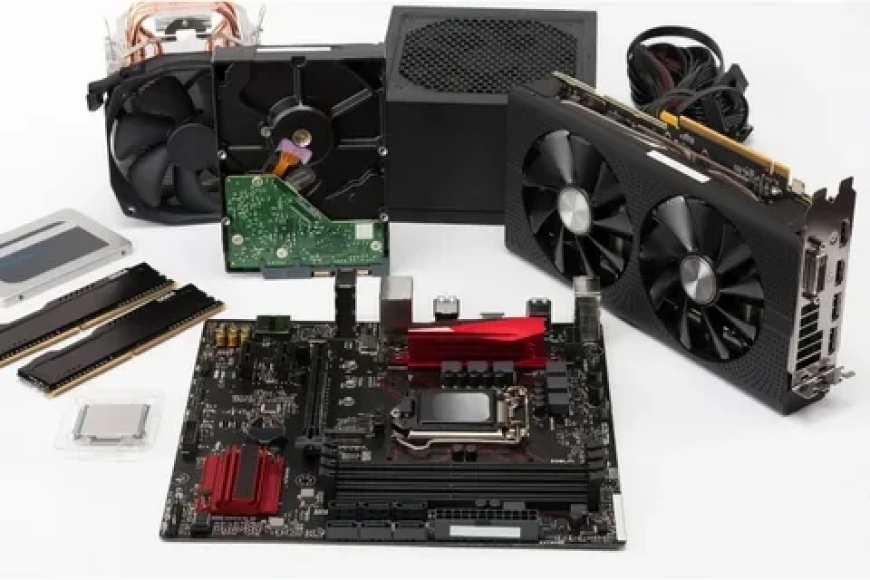Smart Guide to Buying 2nd Hand PC Components in the UK
Discover the benefits, risks, and smart buying tips for 2nd hand PC components. Build a budget-friendly and reliable PC with quality used parts.

Building or upgrading a computer doesnt have to break the bank. With rising hardware prices, many users are turning to 2nd hand PC components to build cost-effective yet powerful systems. From graphics cards and processors to RAM and power supplies, buying used can help you stretch your budget without compromising performance.
However, shopping for second-hand parts requires careful consideration. Unlike new hardware, used components may come with wear and tear, expired warranties, or hidden issues. Still, with proper research and smart purchasing, second-hand hardware can be just as reliable and efficient as brand-new equipment.
Why Consider 2nd Hand PC Components?
Affordability
One of the most compelling reasons people buy used PC parts is to save money. High-end GPUs, CPUs, and motherboards can cost hundreds when new. Purchasing second-hand hardware allows you to get the same performance for a fraction of the price.
Sustainability
Buying used contributes to electronic waste reduction. Reusing hardware extends the lifecycle of electronic products and is an environmentally friendly choice.
Availability
During periods of global chip shortages or high demand, finding new components can be difficult. Second-hand markets often have older models in stock and ready for immediate purchase.
Upgrading Older Systems
If you're trying to upgrade an older desktop, brand-new parts might not be compatible. Second-hand markets can offer older-generation RAM, motherboards, or CPUs that still meet your needs.
Common 2nd Hand PC Components Worth Buying
1. Graphics Cards (GPUs)
GPUs are expensive when new, especially high-performance models used in gaming or rendering. Buying used can save you significantly. Just ensure the card hasnt been used for crypto mining, which can reduce its lifespan.
2. Processors (CPUs)
CPUs are durable and less prone to wear. If you find one in good condition with no bent pins and a working socket, it's a safe purchase. Make sure its compatible with your motherboard.
3. RAM
Memory modules generally have long lifespans. Just check the capacity, type (DDR3, DDR4, or DDR5), and ensure there are no errors through a memory test once installed.
4. Hard Drives and SSDs
Used storage drives can be hit or miss. SSDs degrade over time, and hard drives can fail without warning. If you buy used, ask for the SMART report or test the drive using software like CrystalDiskInfo.
5. Motherboards
Motherboards are critical but can be tricky to evaluate. Inspect for physical damage, burnt areas, or bulging capacitors. Ensure all ports and slots are functional.
6. Power Supplies (PSUs)
A second-hand PSU is a risky choice. Internal wear may not be visible, and a faulty PSU can damage your entire system. Only buy if it's from a reputable brand and used lightly.
Where to Buy 2nd Hand PC Components
Online Marketplaces
Platforms like eBay, Facebook Marketplace, and Gumtree offer a wide variety of listings. Always check seller ratings, request photos, and ask questions about the condition and usage history.
Refurbished Tech Retailers
Websites like CEX, Back Market, and Overclockers UK sell tested and sometimes warrantied second-hand hardware. This adds a layer of reliability to your purchase.
Local PC Repair Shops
Some local stores deal in refurbished or used components. Visiting in person lets you inspect the parts before buying and get immediate answers to your questions.
Tech Forums and Communities
Communities like Reddits r/hardwareswap or UK-based PC building forums offer user-to-user trades. These communities often have higher trust levels and knowledgeable users.
What to Check Before Buying
Compatibility
Before buying any part, confirm its compatible with your existing setup. For example, ensure your motherboard supports the CPU socket type, or that your RAM matches the required DDR generation.
Physical Condition
Inspect for physical damageburns, broken ports, rust, or missing components. Ask for close-up pictures if buying online.
Age and Usage History
Ask how long the part was used and under what conditions. Components used for gaming may be in better shape than those used for mining or overclocking.
Warranty and Return Policy
Some sellers offer limited warranties or return windows. This is useful in case the part fails shortly after purchase.
Test Reports
Request screenshots of system diagnostics or benchmarks, especially for CPUs, GPUs, and drives. This adds confidence to your purchase.
Pros and Cons of Buying 2nd Hand PC Components
Pros:
-
Significantly lower prices
-
Access to older or rare parts
-
Opportunity to build budget systems
-
Environmentally friendly option
Cons:
-
No or limited warranty
-
Risk of wear and shorter lifespan
-
Compatibility issues with newer components
-
Higher chance of scams on peer-to-peer platforms
Tips for First-Time Buyers
-
Do Your Research: Know what part numbers and specifications you need.
-
Avoid Too-Good-To-Be-True Deals: Extremely cheap listings may indicate scams or defective parts.
-
Buy Locally When Possible: This allows for face-to-face inspection.
-
Use Trusted Platforms: Choose sellers with good reputations and buyer protection policies.
-
Test Immediately: Install and stress test the component as soon as you receive it.
Final Thoughts
Whether you're building a gaming rig on a budget, upgrading an older PC, or looking for specific legacy parts, 2nd hand PC components can offer excellent value and performance. With a careful approach, you can find reliable hardware that fits your needs while saving money and reducing e-waste. Make sure to verify compatibility, inspect condition, and purchase from trusted sellers for the best results.
Let me know if you'd like this content customized for a particular website, audience (e.g., gamers or businesses), or region.








































